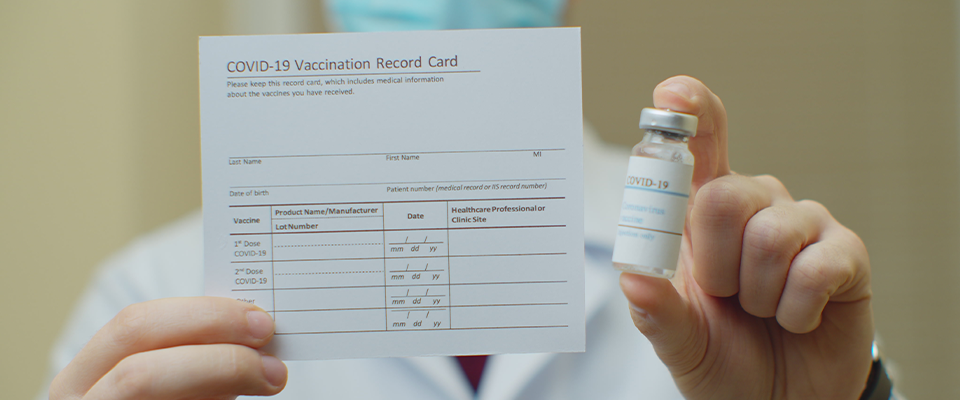Even as California inches toward economic and social reopening, the virus is running rampant in other states—most notably, Michigan—and outside the U.S., in countries that have received little or no vaccine. There is increasing concern that the highly contagious variants now circulating could fuel a nationwide surge this summer.
Thus, the interest in so-called COVID “passports”: app-accessed digital certifications that confirm inoculations against the coronavirus. They would allow vaccinated people to gather en masse at concerts and sporting events, in gyms, and on cruises and flights, secure in their mutual immunity.
Berkeley Law Professor Dorit Rubinstein Reiss says vaccine passports are indeed legal. “The controversy is strictly a political one.”
But the concept hit roadblocks almost immediately, with vaccine opponents and many conservatives declaring certification an invasion of privacy. Some business coalitions also backed away from them, fearing consumer backlash. The Biden administration has declared it will not enforce a verification mandate nor maintain a federal vaccination database. And the governors of Texas and Florida have announced bans on vaccine passports, barring businesses and government agencies from requiring them.
Indeed, many civil libertarians have questioned the essential legality of vaccine passports. But there’s no significant ambiguity on that point, says Berkeley Law Professor Dorit Rubinstein Reiss, an authority on vaccine law and policy.
“They’re legal,” says Reiss. “The controversy is strictly a political one. That said, the language is sloppy. There’s no single ‘passport.’ There are a range of tactical issues that bear on vaccination certification.”
U.S. Supreme Court rulings have upheld compulsory vaccination laws. In a 1905 case, Jacobson v. Massachusetts, the Court declared states were authorized to require and enforce mandatory vaccinations. And in Zucht v. King in 1922, the Court determined that the San Antonio, Texas, school district had a constitutional right to bar unvaccinated students from its campuses.
Currently, employers and public institutions can require vaccinations subject to certain limits detailed in the 1964 Civil Rights Act and the Americans with Disabilities Act of 1990, says Reiss.
Legalities aside, there’s the question of public health. Are vaccine passports a credible mechanism for keeping people safe?
“Under the Civil Rights Act, employers must provide a ‘reasonable accommodation’ to an employee who expresses a sincere religious belief that would prevent them from getting vaccinated,” Reiss says. “But the employer could still require vaccinations for such employees if it imposes an ‘undue hardship’ on the company’s operations.”
Similarly, disabled employees can be exempted from compulsory vaccination if their disabilities raise safety concerns, says Reiss.
“Employers have to participate in a ‘good faith’ process to determine if the disability is a qualification for an exemption and if the employee can be protected from COVID while working,” she says. “An op-out can hinge on the availability and effectiveness of PPE [personal protective equipment] such as masks and face shields. And again, the employer can still require vaccinations if it imposes ‘undue hardship’ on the company.”
Likewise, universities and other public institutions can require mandatory vaccinations, subject to the same stipulations of the Civil Rights Act and the ADA, Reiss says.
Still, some uncertainty over the issue remains due to the process used by the U.S. Food and Drug Administration to green light COVID vaccines. The FDA sanctioned the vaccines under an Emergency Use Authorization (EUA)—essentially, an acknowledgement that the vaccines were fast-tracked and not subjected to the standard regulatory process; technically, they are not federally approved, nor are they licensed.
“Under the EUA, the Secretary of Health and Human Services allowed the use of the vaccines, but taking them remains a matter of personal choice,” says Reiss. “It’s unclear where it all goes because nothing has been interpreted by the courts yet.”
“There are so many barriers to getting vaccinated now that passports aren’t really fair.” —John
Swartzberg
Unions may also figure into vaccination requirements, she says. “The collective bargaining agreement of a unionized workforce may limit the ability of an employer to require vaccinations without engaging in negotiations with the union.”
But when it comes to travel requirements, Reiss says “there’s not much that can be done to resist that legally.” Foreign countries have sovereign authority to require vaccination documentation, and airlines and cruise lines are generally allowed to impose restrictions as well.
Legalities aside, there’s the question of public health. Are vaccine passports a credible mechanism for keeping people safe?
John Swartzberg, a clinical professor emeritus of infectious diseases and vaccinology at Berkeley’s School of Public Health, thinks so—with a couple of caveats. First, like Reiss, he doesn’t feel “vaccine passport” is the best possible name for vaccine certifications.
“Also, before I’d endorse the idea, I’d want to make sure that everyone who wants a vaccination can get it,” says Swartzberg. “And by that I don’t mean vaccines simply become theoretically available to everyone, as was the case when California authorized vaccinations for everyone 16 and older on April 15. I mean everyone who wants one can easily obtain one within a fifteen-minute drive. There are so many barriers to getting vaccinated now that passports aren’t really fair.”
No matter how COVID passports play out legally, says Reiss, the associated politicization is unlikely to diminish.
By summer the situation should be more equitable, says Swartzberg, “and then a lot of good could come from these certifications. If you knew everyone in the airport, on your airline, at a baseball game or your favorite restaurant was vaccinated, you’d feel a lot more secure about going places and doing the things you enjoy. I’m in my 70s now, and I want to teach next semester. I’ll feel a lot better about going on campus if I know that everyone—students, faculty, and staff—are vaccinated.”
Swartzberg emphasizes that vaccine certifications are nothing new.
“I grew up with the ‘yellow card,’ the yellow fever vaccination certificate that was widely required for international travel,” Swartzberg says. “We need thoughtful discussion on COVID matters, including vaccine passports—but everything is politicized, particularly in states such as Texas and Florida.”
And no matter how COVID passports play out legally, the associated politicization is unlikely to diminish, says Reiss.
“For certain people, they’re a rallying cry,” she says. “The implementation is likely to be piecemeal. As I said, they’re generally legal—but I expect them to remain controversial.”





















